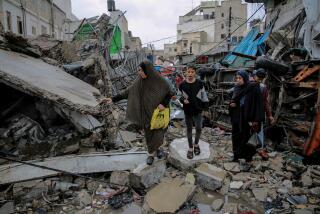For Displaced Falloujans, a New Battle Underway
- Share via
BAGHDAD — At nightfall, when temperatures here drop into the 40s, Fallouja laborer Hatam Allawi and his veiled wife, Nadia, gather their seven small children into a 10-by-10-foot canvas tent, where the youngsters jostle for position close to a kerosene heater.
They sit on the ground under a naked lightbulb hanging from a cord that runs to a nearby mosque. The only chair is a red plastic child’s seat reserved for their oldest son, 10, who has a disability that makes his arms and legs shake. Two other children, ages 5 and 2, have physical and mental disabilities that require their parents to constantly coddle them.
Life was difficult enough a month ago, when the family shared an apartment in Fallouja and Allawi eked out a living making mattresses by hand.
“At least we had a home,” said Allawi, one of more than 500 people now living at a makeshift camp in Baghdad for displaced Falloujans. They left another encampment two weeks ago when food and supplies ran out. “Now we are refugees,” he said.
For thousands of the displaced, the struggle continues even though major combat in Fallouja ended weeks ago. More than 200,000 civilians fled the city before the U.S.-led invasion last month, moving in with relatives, filling up hotels or leaving the country.
Like the Allawi family, thousands with no place to go sought shelter in temporary camps, schools, mosques and vacant commercial buildings in Baghdad and surrounding cities.
Nearly 12,000 Iraqis living in a vacant tourist complex west of Fallouja have been protesting in recent days for the right to return home. In the capital, tent cities have sprung up at the Baghdad International Fair, Baghdad University and other sites.
“These people were forced to leave comfortable homes and now find themselves living in tents at the start of winter,” said Sheik Hussein Zobai, imam of the Baghdad University mosque. “We thought the only prison in Iraq was Abu Ghraib, but because of what the Americans have done, the whole country has become a prison.”
The Ministry of Trade is preparing to make one-time payments of $100 to needy families, said Raad Fahmi, director of the ministry’s food supplies and planning department. The government has also opened food distribution centers in Baghdad to enable displaced residents to get monthly food rations.
But Iraqi and U.S. military officials say it’s unclear when residents will be allowed back into Fallouja, which was heavily damaged in the fighting.
“Offensive operations are technically not over yet,” said 1st Lt. Lyle L. Gilbert, spokesman for the 1st Marine Expeditionary Force in Fallouja.
In addition, electricity has not yet been restored, according to Lt. Col. Steven A. Boylon, a military spokesman. U.S. and Iraqi officials plan to spend more than $170 million on infrastructure improvements in Fallouja in the coming weeks.
Some Iraqi government officials, under pressure to allow citizens back in time for next month’s election, have suggested that people might begin returning this month.
But U.S. military officials say they want to move slowly to avoid allowing insurgents back into the city.
Much of the burden for taking care of the displaced Falloujans is falling to private aid groups and a handful of humanitarian organizations still operating in Iraq, including the Iraqi Red Crescent Society, which has been distributing mattresses, blankets and clothing.
“The government really should be doing more to help,” said Saleem Ghari Abdul-Baqi, chairman of the Human Aid Society, an Iraqi group set up after the war’s initial heavy combat subsided last year.
The group played host to about 25 families at the Baghdad fairgrounds until supplies ran low and the families were relocated.
“Some of these people will never be able to go back home because their homes have been destroyed,” said Jasim Bahady, an attorney for the group. “We will be dealing with these people for a long time.”
At the Baghdad University mosque, Zobai invited families to live inside the powder-blue domed structure and set up tents on surrounding farmlands. More than 100 families have moved in, sharing an outdoor hose for water and digging up lettuce and other crops for food.
In a cement structure next to the mosque, Zobai sat recently in front of a small table with a pile of blank slips of paper as several dozen anxious Falloujans lined up to seek his help. Most of the displaced are low-income residents who don’t have relatives to take them in. One distraught woman in a head-to-toe black abaya clutched a tissue while tearfully explaining that her family of 17 had no place to go. She received a slip from the sheik for some mattresses, but asked, “Where am I going to put them?”
Zobai laughed when asked whether the U.S. or Iraqi government had offered supplies or other assistance. He said the only visits he had received were two 4 a.m. raids by Iraqi national guardsmen searching for insurgents among the families.
During the day, scores of children pass the time playing soccer or digging in the farmlands. Most have missed more than a month of school.
Many Falloujans said they were eager to go home. “Even if we had to live on the sand in Fallouja, it’s much better than staying here,” said Firas Sauod, 31, an unemployed laborer.
Allawi said he too was eager to return home with his family but, like many Falloujans, was uncertain whether his apartment building survived the November battles between U.S.-led forces and guerrillas.
“I try not to think about it,” Allawi said. “For now, it’s better not to know.”
More to Read
Sign up for Essential California
The most important California stories and recommendations in your inbox every morning.
You may occasionally receive promotional content from the Los Angeles Times.










